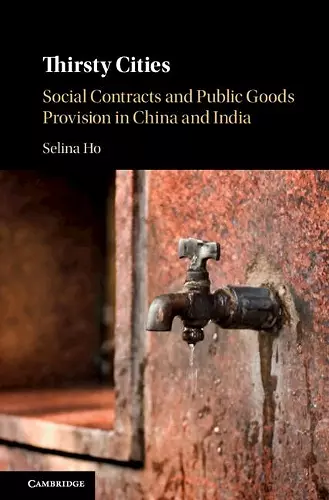Thirsty Cities
Social Contracts and Public Goods Provision in China and India
Format:Hardback
Publisher:Cambridge University Press
Published:10th Jan '19
Should be back in stock very soon
This hardback is available in another edition too:
- Paperback£30.99(9781108825078)

Provides the answer to the enduring puzzle why India lags behind China in offering public goods to its people.
The experiences of the two rising powers of Asia, China and India, in providing drinking water highlight an important puzzle - why do some countries provide more public goods than others? The book argues that public goods vary according to the social contract between a government and its people.Why does authoritarian China provide a higher level of public goods than democratic India? Studies based on regime type have shown that the level of public goods provision is higher in democratic systems than in authoritarian forms of government. However, public goods provision in China and India contradicts these findings. Whether in terms of access to education, healthcare, public transportation, and basic necessities, such as drinking water and electricity, China does consistently better than India. This book argues that regime type does not determine public goods outcomes. Using empirical evidence from the Chinese and Indian municipal water sectors, the study explains and demonstrates how a social contract, an informal institution, influences formal institutional design, which in turn accounts for the variations in public goods provision.
'An excellent study on the differential performances of China and India in distributing public goods provisions. With the aid of case studies of water supply in four Chinese and Indian cities, Selina Ho captures an enduring puzzle as to why India lags behind China in offering collective goods to its population, despite its democratic credentials. A must read for all interested in development as well as all politicians and bureaucrats in India!' T. V. Paul, James McGill Professor of International Relations, McGill University, Canada
'Selina Ho's Thirsty Cities is an original, ingenious, and admirably researched account that sets out to explain why China's cities provide a much higher level of drinking water than do India's. But the book goes far beyond that. It introduces a novel concept, the 'social contract' - an informal institution that serves as an implicit agreement between leaders to rule in a manner that, to establish their own legitimacy, meets citizens' expectations. Using it, Ho skillfully contrasts China's with India's mode of governance in recent decades and thereby explicates a great deal about their divergent regimes. China's government, which fosters capacity and local government autonomy, is grounded in material-cum-moral performance, while India's (despite its democracy) is situated in ideals of socialism and populism, which afford far less administrative efficacy, she demonstrates. A book with wide applicability across the globe today.' Dorothy J. Solinger, Professor Emerita, University of California, Irvine
'This book wrestles intelligently with the puzzle of why an authoritarian regime, China, is more proficient at providing essential public goods than a robust democracy, India. This counter-intuitive outcome is the subject of this important work by Selina Ho. She highlights the crucial role of informal institutions and normative principles in explaining service provision as determinant rather than regime type or other factors. The work is essential reading for anyone interested in the relationship between the politics of welfare, regime type and public goods provision.' Tony Saich, Daewoo Professor of International Affairs, Director, Ash Center for Democratic Governance and Innovation, Harvard Kennedy School
ISBN: 9781108427821
Dimensions: 235mm x 157mm x 21mm
Weight: 570g
306 pages